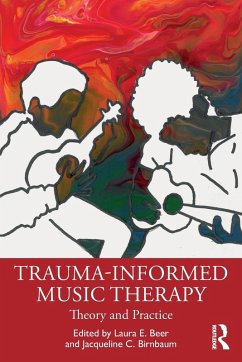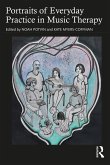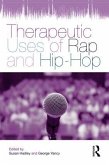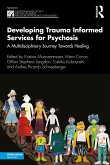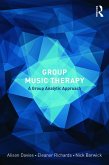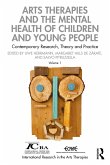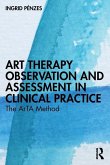Trauma-Informed Music Therapy is a timely volume that combines theoretical perspectives on trauma-informed practice with real-life applications in music therapy practice.
Board-certified music therapists are in a unique position to provide comfort, create a sense of safety, and empower people to find their voice during and after traumatic experiences. In this book, the theory behind trauma-informed practice (TIP) is explored and expanded through stories of clinical implementation, social justice practices, and music therapy theories. Spanning topics such as grief and loss, adverse childhood experiences and their intergenerational effects, domestic abuse, urban trauma, polyvagal theory, and psychological first aid, this book addresses music therapy as the emerging therapeutic treatment modality for adults, children, and teenagers alike.
This book will be of interest to practicing music therapists and music therapy students who are learning how to bring music therapy to victims and survivors of trauma.
Board-certified music therapists are in a unique position to provide comfort, create a sense of safety, and empower people to find their voice during and after traumatic experiences. In this book, the theory behind trauma-informed practice (TIP) is explored and expanded through stories of clinical implementation, social justice practices, and music therapy theories. Spanning topics such as grief and loss, adverse childhood experiences and their intergenerational effects, domestic abuse, urban trauma, polyvagal theory, and psychological first aid, this book addresses music therapy as the emerging therapeutic treatment modality for adults, children, and teenagers alike.
This book will be of interest to practicing music therapists and music therapy students who are learning how to bring music therapy to victims and survivors of trauma.
"Trauma can be caused by various origins, not only by natural disasters but also violence, social oppression, and so on. This book covers such a wide range of populations who are affected by various origins of trauma, as well as overarching trauma theories. As someone who experienced the Great East Japan earthquake and nuclear disaster in 2011, I know how important and effective the trauma work can be. This book will be a valuable resource for students and professionals who wish to work with such populations. I highly recommend this book."
Yuji Igari, M. S., Associate Professor of Music Therapy, Nagoya College of Music, Japan
"This book includes chapters by a stellar group of international contributors, many of whom are recognized as authorities in their areas of expertise. The topics covered are highly relevant in the contemporary world, including natural disaster trauma, cultural issues including race and gender/sexual preference identity, and sexual and intimate partner violence, in addition to the more traditional focuses of psychiatry and oncology. Contemporary approaches are used to develop broad-based theory that is relevant across specific clinical areas and music therapy treatment models. This book is an essential resource for music therapists working within psychotherapy contexts."
Kenneth Aigen, Director of Music Therapy, New York University, USA
"This book offers an essential introduction to principles of trauma-informed practice in music therapy. The editors bring together a collection of voices that demonstrate the potential for music to assist in the healing process in the aftermath of difficult events that shape our lives. It will be an incredibly valuable resource to both students and experienced practitioners across the creative arts therapies."
Prof. Nisha Sajnani, Director, Program in Drama Therapy, New York University, USA
"Trauma can affect people in many ways. This book discusses trauma-informed practice (TIP), laying a theoretical framework and drawing together some of the ways of working with trauma. The authors come from a variety of backgrounds and clinical settings, thus presenting various perspectives on this work. An awareness of the power dynamics that may intersect with experiences of trauma runs through a number of the chapters. I expect that music therapists and others will be stimulated by the contents and excited to read about new approaches to trauma-informed practice in music therapy."
Barbara L. Wheeler, PhD, MT-BC, Professor Emeritus, Montclair State University, USA
Yuji Igari, M. S., Associate Professor of Music Therapy, Nagoya College of Music, Japan
"This book includes chapters by a stellar group of international contributors, many of whom are recognized as authorities in their areas of expertise. The topics covered are highly relevant in the contemporary world, including natural disaster trauma, cultural issues including race and gender/sexual preference identity, and sexual and intimate partner violence, in addition to the more traditional focuses of psychiatry and oncology. Contemporary approaches are used to develop broad-based theory that is relevant across specific clinical areas and music therapy treatment models. This book is an essential resource for music therapists working within psychotherapy contexts."
Kenneth Aigen, Director of Music Therapy, New York University, USA
"This book offers an essential introduction to principles of trauma-informed practice in music therapy. The editors bring together a collection of voices that demonstrate the potential for music to assist in the healing process in the aftermath of difficult events that shape our lives. It will be an incredibly valuable resource to both students and experienced practitioners across the creative arts therapies."
Prof. Nisha Sajnani, Director, Program in Drama Therapy, New York University, USA
"Trauma can affect people in many ways. This book discusses trauma-informed practice (TIP), laying a theoretical framework and drawing together some of the ways of working with trauma. The authors come from a variety of backgrounds and clinical settings, thus presenting various perspectives on this work. An awareness of the power dynamics that may intersect with experiences of trauma runs through a number of the chapters. I expect that music therapists and others will be stimulated by the contents and excited to read about new approaches to trauma-informed practice in music therapy."
Barbara L. Wheeler, PhD, MT-BC, Professor Emeritus, Montclair State University, USA

